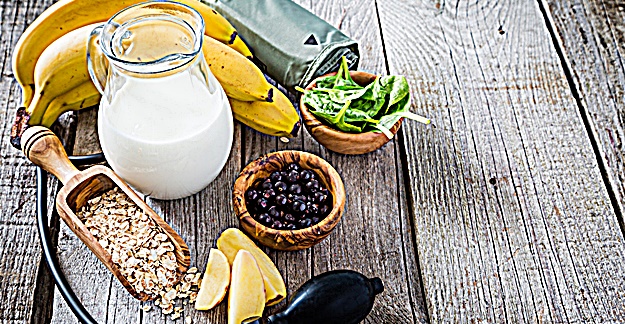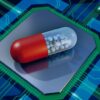If you have hypertension — high blood pressure — you may think that the only way to control it is to take a drug. But did you know that many classes of hypertension drugs have serious side effects?
For instance, beta blockers – such as Lopressor and Toprol-XL (metoprolol), Tenormin (atenolol) and Bystolic (nebivolol) — can slow the heart rate down too much, may cause depression, insomnia, or cold hands and feet, can worsen asthma symptoms, lead to impotence and increase the risk of bronchospasm. Calcium channel blockers — such as Norvasc (amlodipine), Cardizem (diltiazem) and Verelan (verapamil) — may lead to slow heartbeat or palpitations, swollen ankles, constipation, headaches and dizziness.
And ACE (angiotensin-converting enzyme) inhibitors, including Lotensin (benazepril), Vasotec (enalapril) and Prinivil/Zestril (lisinopril), may cause skin rashes, loss of taste or a chronic cough. A rare but potentially lethal side effect of the ACE inhibitor benazepril was reported in The American Journal of Case Reports. The report described a 61-year-old man who went to the emergency room with severe throat pain and difficulty swallowing that lasted over a week. He said he was being treated for hypertension and was taking amlodipine and the ACE inhibitor benazepril for it.
At the hospital, the patient was diagnosed with neutropenia, also referred to as agranulocytosis, an abnormally low level of a type of white blood cells called neutrophils. Neutropenia leaves people more susceptible to infection. He was admitted and given antibiotics for the pharyngitis he also had.
Given that the patient started benazepril two months before symptoms started, and neutropenia is rarely seen with amlodipine, doctors suspected benazepril to be the cause of his drug-induced agranulocytosis (DIAG). After he was taken off benazepril, the patient achieved a quick recovery in white blood cell count. And after three weeks, the patient’s white blood cell count remained in the normal range.
Drugs to treat cancer and antibiotics are the most common causes of DIAG, and there have been prior instances of trial subjects taking benazepril who developed the condition.
“Because [ACE inhibitors] are commonly employed drugs, we report this case to increase awareness among prescribers about this rare but potentially lethal side effect of benazepril,” the authors concluded.
In addition to side effects, these drugs can cause on their own, taking other prescription or over-the-counter drugs, and even some herbs, along with blood pressure medications can bring on a slew of new problems. For example, cold and sinus medications contain substances that raise blood pressure and interfere with antihypertensive meds. (See MedShadow’s Heart Drugs Can Interact with Common Meds.)
While medications may be needed in some cases of hypertension, South Florida cardiologist Adam Splaver, MD, of Nano Health Associates suggests there is a range of effective treatment options available that can help you reduce hypertension naturally.
“Aerobic exercise, dynamic resistance exercise, isometric handgrip, meditation, stress reduction, as well as biofeedback devices such as RESPeRATE and Spire, are wonderful non-pharmacological modalities that can effectively lower your blood pressure,” he says.
“These modalities can offer great results in real life. And studies have shown they may reduce your systolic blood pressure [top number] significantly,” adds Dr. Splaver.
Doctors are usually happy to support alternatives to drugs, but since hypertension is a serious medical condition, it’s best to get their advice on whether these options are safe to use alone or as an addition to medication. And don’t stop taking blood pressure medications without talking to your doctor. Abruptly stopping these meds can be dangerous. (See MedShadow’s When Side Effects Prevail.)
Browse This Article
Exercise Regularly
If you have hypertension, getting regular exercise can be just as effective at lowering your blood pressure as taking medication, according to a meta-analysis published in the British Journal of Sports Medicine.
Researchers analyzed data from 194 trials that looked at how drugs lowered high blood pressure, as well as 197 trials that looked at exercise in reducing hypertension. These trials included more than 40,000 people, though none of them compared medication against exercise (such as walking, jogging, cycling, swimming and strength/weight training) head to head. They also included people both with and without hypertension.
Overall, those treated with medication had lower blood pressure than those who exercised. However, when analyses looked only at those with hypertension, exercise appeared to be just as effective as drugs in lowering blood pressure. And in those with very high systolic blood pressure (over 140 mm Hg), exercise was more effective than medication.
Researchers cautioned, however, that their study doesn’t mean that people should stop taking high blood pressure medications. Three-quarters of American adults do not get the recommended amount of physical activity, so getting people with hypertension to start exercising can be an uphill battle.
“It’s one thing to recommend that physicians start prescribing exercise to their patients, but we also need to be cognizant of the resource implications and ensure that the patients that have been referred to exercise interventions can adhere to them and so really derive benefit,” lead author Huseyin Naci, Ph.D., an assistant professor of health policy at the London School of Economics, said in a statement.
Engaging in regular exercise is key to maintaining healthy blood pressure, as well as improving your overall cardiovascular health. Either aerobic exercise (speed walking, jogging, running, dancing, cycling, swimming), strength training (weight lifting and circuit training), or both can improve your cardiovascular well-being.
The American College of Sports Medicine (ACSM) recommends that people with high blood pressure perform aerobic exercise five to seven days per week for 30 to 60 minutes, resistance exercise two to three days per week, and flexibility exercises two to three days per week. According to the ACSM, regular aerobic exercise can lower resting systolic blood pressure by 5 to 7 mm Hg, and resistance exercise can lower resting diastolic (bottom number) blood pressure by 2 to 3 mm Hg, and even more for people with higher blood pressure. These improvements in resting blood pressure can translate to a reduction in cardiovascular disease risk of 20% to 30% for people with high blood pressure.
However, in older people who are overweight or obese, just 30 minutes of exercise a day can reduce blood pressure almost as much as taking medication. In a study published in the journal Hypertension, researchers enrolled 67 people between the ages of 55 and 80. Depending on the day of the study, participants either did no exercise all day, did 30 minutes of morning exercise (walking on a treadmill at moderate intensity) followed by sitting the rest of the day or 30 minutes of morning exercise followed by light walking for a few minutes every 30 minutes. Results showed that blood pressure was reduced when participants took part in morning exercise compared to days when they didn’t. Women who took breaks throughout the day to walk saw additional reductions in blood pressure, though this same effect was not seen in men who engaged in walking.
Exercise strengthens the structure of arteries and positively influences the autonomic nervous system, which controls bodily functions that you don’t consciously think about, such as regulating blood pressure, breathing, heartbeat and digestion.
Just be aware that for uncontrolled, severe hypertension (a blood pressure reading equal to or above 180/110 mmHg), exercise may not be recommended due to the changes in blood pressure that occur during and after exercise.
“It’s always best to consult with your physician to ensure you are medically cleared to perform such exercise programs,” advises Dr. Splaver.
Change Your Diet
“At 80, my mother was released to hospice care with 10% heart function. Being too weak to go home, I brought her to my house,” says Meg Donahue, referring to her mother, Millie. “After doing research, we decided to try changing her diet to a whole-food, plant-based diet. Because my mother was so weak, at first we fed her tiny smoothies and blended soups.
“Over the next year, she gradually gained strength. And now, at the age of 88, her heart function and blood pressure are near normal. She swims four times a week, drives, and plays with her granddaughter daily,” adds Donahue. “It sounds like a miracle, but really the only miracle is we changed what she ate from foods that harm to foods that heal.”
Regular exercise, following a more healthy diet and engaging in meditation and deep breathing can have health benefits beyond lowering blood pressure.
Indeed, studies have shown that whole food diets such as the Dietary Approaches to Stop Hypertension (DASH) diet and the Mediterranean diet reduce blood pressure and improve overall cardiovascular health.
Both diets are rich in natural, whole foods sources — fruits and vegetables, whole grains, fish, poultry, beans and low-fat dairy products. The diets minimize added salt and sugar and provide ample nutrients in the way of vitamins and minerals, particularly potassium, calcium and magnesium. Research indicates that these minerals are important to blood pressure control.
Some studies have indicated that those who consume more potassium have significant reductions in blood pressure. Increasing calcium intake has also been shown to reduce blood pressure, and low levels of magnesium are a risk factor for hypertension. It is well known that lowering the amount of sodium in your diet helps reduce blood pressure levels. Many processed foods have high amounts of salt in them, so try to avoid them as much as you can.
There are also indications that certain nuts, seeds, dark chocolate and foods high in probiotics, like yogurt, can help bring down blood pressure. Dark chocolate is thought to lower blood pressure because it is rich in substances known as flavanols, which promote nitric oxide production in the body. The chemical widens blood vessels, reducing blood pressure. And an analysis of nine clinical trials on the effect of probiotics on blood pressure revealed that probiotic consumption, primarily from yogurt, reduced both systolic and diastolic blood pressure. People with hypertension who consumed multiple species of probiotics for longer than eight weeks had the greatest blood pressure improvement.
Relax and Breathe Deeper
“Despite being fairly young, physically active, vegan, and otherwise healthy, I was diagnosed with hypertension in 2013,” says Harley Sears, a hypnotist based in Kansas City, Missouri. “Because of my family history of high blood pressure, my doctor said there was little I could do to manage the condition and prescribed lisinopril. While I was reluctant, I immediately began the medication and my blood pressure returned to normal that evening.”
“It didn’t take long to experience side effects from the drug and I developed an annoying cough that interfered with my work,” he noted. “Despite my doctor’s objections that it wouldn’t work, I began practicing daily meditation. Within five months, I was taken off the lisinopril and my blood pressure has stayed consistently normal since then,” adds Sears.
Meditation is a relaxation technique that produces both muscle relaxation and mindful awareness that help people manage stress. Another important aspect that meditation influences is breathing.
Combining the effects of deep breathing, muscle relaxation and mindfulness influences the autonomic nervous system, slowing down heart rate and reducing blood pressure. (See MedShadow’s How Meditation Helps My Patients Heal.)
Biofeedback Devices
RESPeRATE is an FDA-approved device for blood pressure and stress reduction. A strap is placed around the chest, headphones are put on the ears, and then the strap and headphones connect to the device. RESPeRATE then creates a musical tone that mimics your inhalation and exhalation. As you listen to the tone, your breathing matches the pattern and the device slowly guides you toward slower, deeper breathing. For lowering blood pressure, you only need to use the device for about 15 minutes a day.
Spire is a small device you attach to your clothing that feeds data on your activity and breathing rate into an app, to help you identify stress patterns and adjust your behaviors. The app lets you know when your breathing is faster than usual, encouraging you to calm down. This, in turn, can help lower your blood pressure. Whether or not you need to take medication to help get hypertension under control, support from your family can help you stick with new lifestyle choices. In a 2019 study published in The Lancet, family support and local, non-physician health workers (NPHW) working together lowered blood pressure more successfully than the present medical strategies.
In the trial, NPHW worked with the families of patients to incorporate lifestyle changes and treatment into daily lives. Nearly 1,400 people in Colombia and Malaysia were followed for a year and experienced twice the reduction in cardiovascular disease risks, such as cholesterol levels and blood pressure, than those with typical medical care.
And if you’re diagnosed with mild hypertension and prescribed medication, consider the results of a study of more than 38,000 patients with low-risk, mild hypertension (blood pressure of 140-159/90-99 mm Hg untreated by medication).
Researchers conducted an observational study, looking at the 38,000 patients over 15 years. At the outset, none of them were receiving hypertension medications. They then compared those who were eventually treated with drugs to those who never received any treatment. Those who took a high blood pressure medication did not have a lower risk of heart attack or stroke compared to those who didn’t receive any treatment, the researchers reported in JAMA Internal Medicine.
However, those who took the medications had an increased risk of hypotension (very low blood pressure), fainting and kidney damage.
The findings indicate that “doctors should be cautious when considering hypertension treatment in this group and we would, therefore, encourage a conversation between a patient and their doctor to decide the best way to treat the condition,” lead author James Sheppard, Ph.D., University of Oxford, said in a statement. “Younger patients, in particular, may prefer to adopt lifestyle changes to reduce their blood pressure, rather than committing to taking antihypertensive drugs for many years.”
While all people will experience varying results with non-pharmacological strategies, “real life and scientific evidence both reinforce the idea that staying active, exercising, breathing and stress reduction techniques, as well as losing weight, can — and should — be part of anyone’s healthy lifestyle,” concludes Dr. Splaver.
More from MedShadow
Which is more effective: drugs or lifestyle change?







